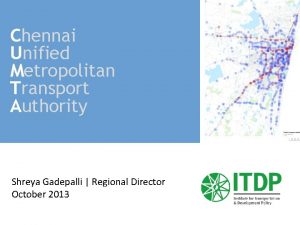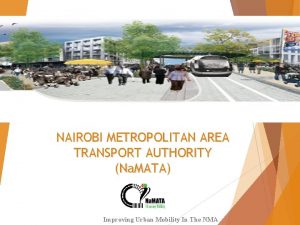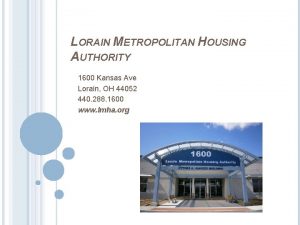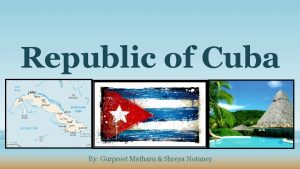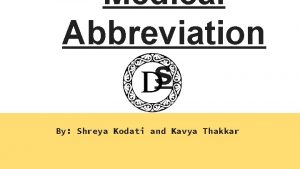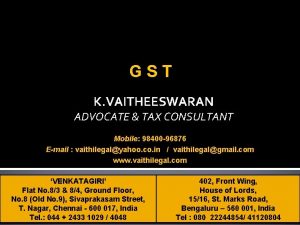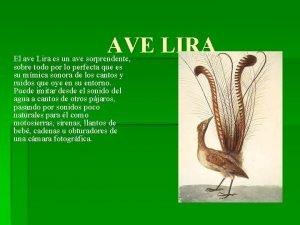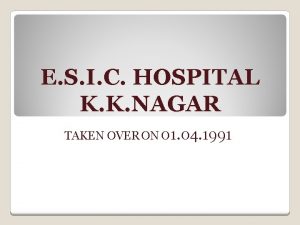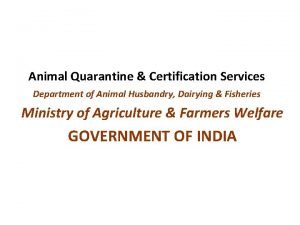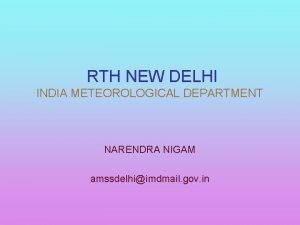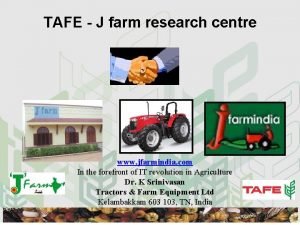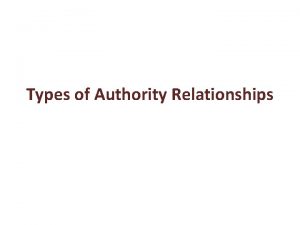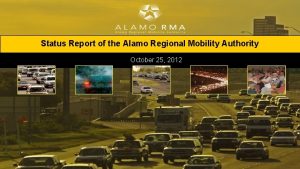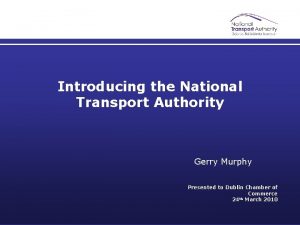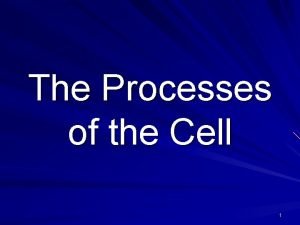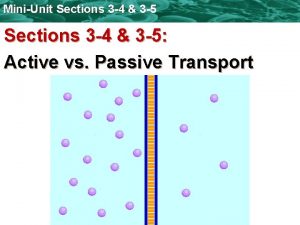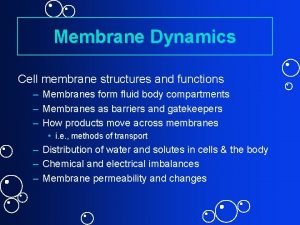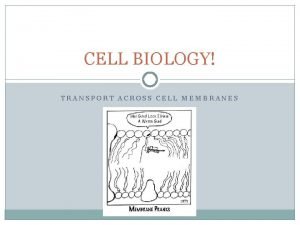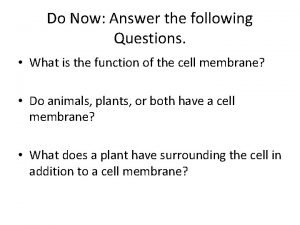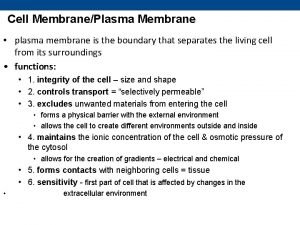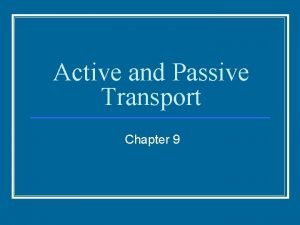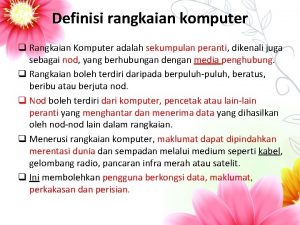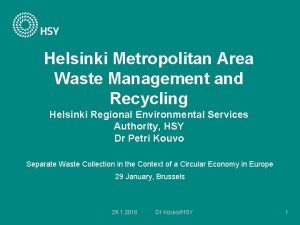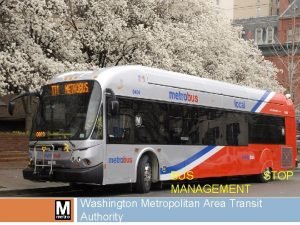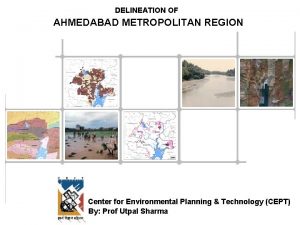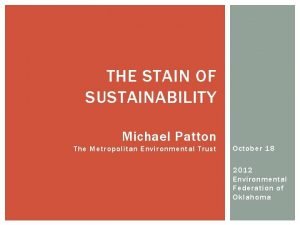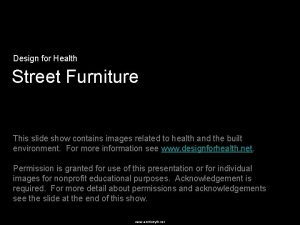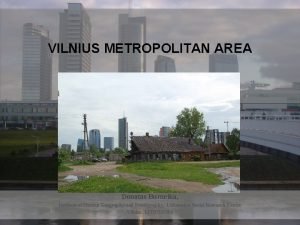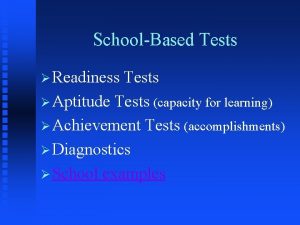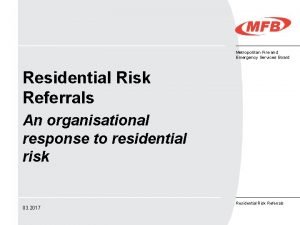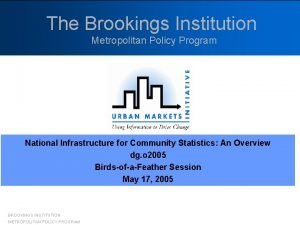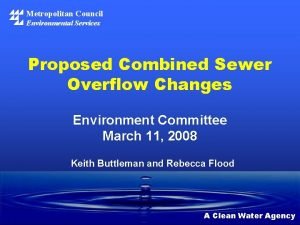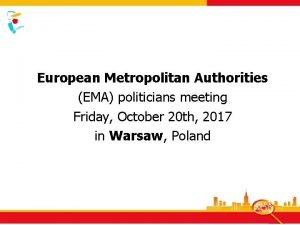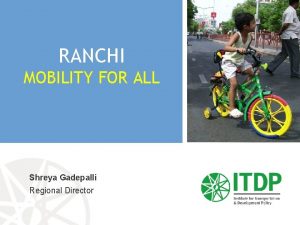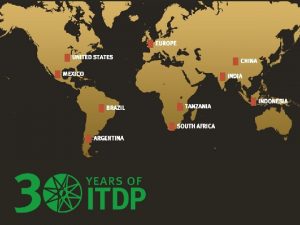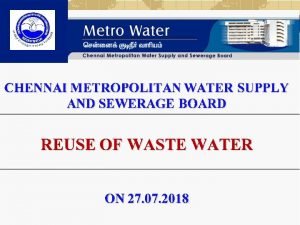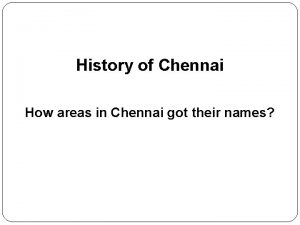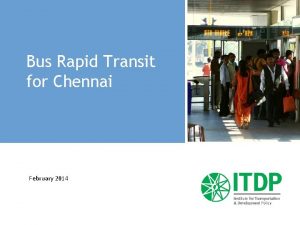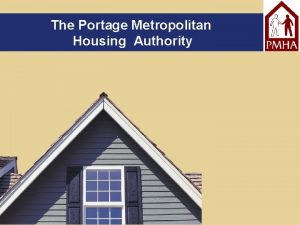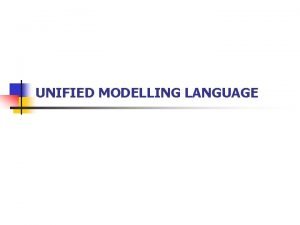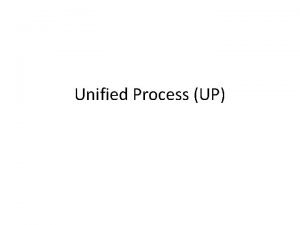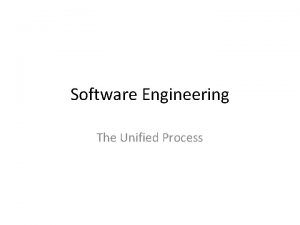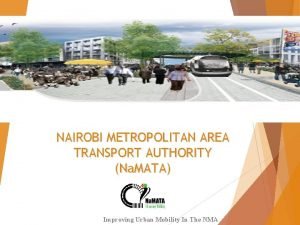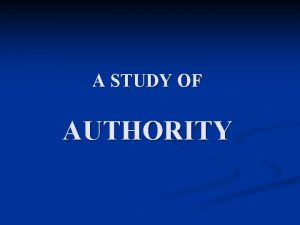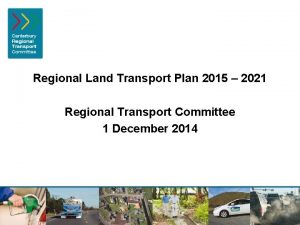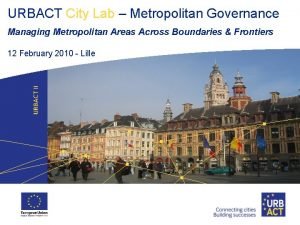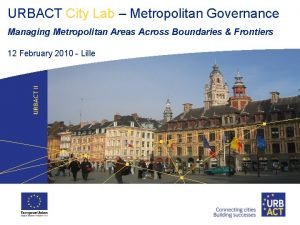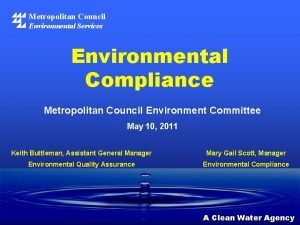Chennai Unified Metropolitan Transport Authority Shreya Gadepalli Regional




















































- Slides: 52

Chennai Unified Metropolitan Transport Authority Shreya Gadepalli | Regional Director October 2013


Chennai UMTA • Created in 2010 through an Act (No. 44 of 2010) • Board consists of all relevant departments/agencies • • Transport Minister – Chairperson Chief Secretary – Vice Chairperson Chief Planner – Transport (CMDA) – Member Secretary Secretaries of Transport, Municipal Admin, Housing & UD, Home, Finance, Special Initiatives (Metro etc. ), & Highways Commissioners of Corporation, Police, Transport GM and DRM – Southern Railways Member Secretary – CMDA MD – MTC and CMRL • Executive Body – Meets once in a Quarter • Subcommittees – Meet every month

CUMTA Workshop January 2013

Three-day hands on planning (Lead by Senior IAS Officials. Over 50 participants) 1. Developing an integrated, high quality bus and BRT network for Chennai. 2. Improving streets and public realm 3. Management of Road Space and Travel Demand 4. CUMTA as an Agent of Change in Chennai Metropolitan Area





18000 lane-km of new roads! 3500 new buses 88 km BRT Street redesign Investment: Rs. 36, 000 cr Investment: Rs. 3, 000 cr

Mode Shift 2013 – 2018 Goal PT to achieve 60% motorized modes

1 Developing an Integrated, High Quality Bus & BRT Network OBJECTIVES • Finance expansion of the bus fleet to better serve existing demand expand public transport usage. • Implement BRT to expand the reach of mass rapid transit. • Provide better information to enhance public transport user experience. • Simplify fare collection and integrate it across modes.

684 7000 6000 1 800 5000 4000 BUS FLEET REQUIREMENT: 1000 3 400 3000 2000 883 Enhancing Bus Fleet & Quality Yr 2013: 5, 000 Yr 2018: 7, 000 0 Existing For comfortable journey Due to Shift from share autos Reduction because of route rationalisation

26% 64%


OMR 3 lanes 2500 PCU/hr/dir (3000 pphpd) 400 crores

OMR 2 lanes 1500 PCU/hr/dir (1800 pphpd) 400 crores + Elevated road 2 lanes 2400 PCU/hr/dir (2880 pphpd) 700 crores 60% increase in road capacity 175% additional cost

OMR 2 lanes 1500 PCU/hr/dir (1800 pphpd) 400 crores + BRT system 1 lanes 50 -300 buses/hr/dir (5000 -30000 pphpd) 120 crores 200 -1000% increase in road capacity 30% additional cost

CHENNAI BRTS Network Length: 88 km Estimated Ridership: 1. 2 million/day

High quality stations | Real-time information Smart electronic fare collection at stations

Rapid | Dependable Easy to access

2 Improving Streets and the Public Realm OBJECTIVES • Develop uniform street design standards. • Identify major cycle movement patterns and design an integrated cycle track and greenway network for the entire city. • Adopt urban design standards and planning regulations to improve pedestrian safety, create public amenities, and improve pedestrian network connectivity. • Ensure seamless connectivity from bus and rail-based mass rapid transit stations to other modes, including bus, para-transit, walking, and cycling.

Consensus reached on the following objectives:

Develop a Cycle Network Strategy

3 Management of Road Space and Travel Demand OBJECTIVES • Identify strategic changes to balance and intensify land uses along major public transportation corridors. • Implement a robust on-street parking management and enforcement system. • Identify reforms that can improve the efficiency of offstreet parking. • Identify road pricing options for Chennai.

Consensus reached on implementing a robust on-street parking management and enforcement system • Creation of Special Purpose Vehicle – Chennai City Parking Management Company • Inventory of existing parking system – Document supply (paid, unpaid, no parking, and unregulated) – Document parking usage • Detailed street mapping • Detailed street design • Financial model for SPV – Parking revenue to escrow account – Co. C leads SPV formation and project implementation – Revenue supports allied works (NMT and Bus improvement)

4 CUMTA as an Agent of Change in Chennai Metropolitan Area OBJECTIVES • CUMTA as a planning, monitoring, and coordinating body • Develop robust institutional mechanisms to facilitate interagency coordination. • Develop CUMTA’s data collection and monitoring program • Institutionalize performance-based transportation planning and management. • Develop a financing plan for transport Chennai. • Communicate with the public and get their support for sustainable transport initiatives.

CUMTA BOARD Resource Mobilization (Funding) NMT (Streets) MMI (Transit)

CUMTA Core Functions (Proposed) Data Analysis & Reporting Planning , Strategy & Research Funding & Financing Integration Pilot Project & Program Mgt. Communications & Engagement

CUMTA Action on Ground


NMT Subgroup: Corporation of Chennai leadership Footpaths on 330 Bus Route Roads (71 BRR in 2013 -14) Greenway Network Cycle Sharing System NMT Policy & Street Design Standards Parking Management & Enforcement


Minimum zone widths (IRC)

Property entrances 1. Ending the footpath with abrupt curbs is not acceptable 2. Lowering the entire footpath to the level of the carriageway is unacceptable as property entrances may become waterlogged 3. Vehicle ramps should be provided in the ‘furniture zone’ and not in the ‘pedestrian zone’

NMT Policy For narrow ROWs, the entire width should be designed as a slow zone On wider streets, a separate slow zone is necessary

NMT Policy Vision Chennai will be a city with a general sense of well-being through the development of quality and dignified environment where people are free to walk and cycle; equitable allocation of public space and infrastructure; and access to opportunities and mobility for all residents.

NMT Policy Goals • Improved access and mobility for all citizens • Improve safety for all citizens • Social and economic empowerment through the provision of improved low-cost mobility. • Equity through the provision of NMT facilities that are safe to use for people of all ages, gender, social and economic status, and physical ability. • Reduced local and global environmental impact of COC’s transport system through expanded use of zero pollution modes.


Chennai Cycle Sharing • Provide easy first and last mile connectivity to public transport. • Encourage middle class to start using bicycles, especially for short trips. 300 m walksheds

Public Cycle Sharing System A high quality public transport system based on cycles available in a closely spaced network of stations.

Key features High quality cycles Stations with automatic docking units Smart cards and RFID to track users and cycles

Chennai Cycle Sharing • 158 cycle sharing stations sited near: – Rapid transit stations – Commercial centres, colleges, parks, cultural destinations – Areas without public transport access • 3 sizes: – Large: 60 docks or parking area – Medium: 30 docks – Small: 15 docks • 3, 090 cycles

Implementation costs Capital costs • • Stations Cycles IT equipment Redistribution vehicles Software Control centre Website @ Rs 80, 000/cycle: Rs 24. 7 cr Annual operating costs • • • Redistribution Cycle cleaning & repair Station maintenance IT: software + web Customer service Administration @ Rs 10, 000/cycle: Rs 3 cr

Parking Policy Management & Enforcement Chennai Corporation Parking SPV Parking fee collection: Meter, Mobile Non-payment enforcement: Clamping, Fine Traffic Police No parking zone enforcement: Clamping, Towing No parking zone enforcement: issuing fines

IT-based fee collection system User begins parking event and pays fee to Parking SPV. On-street device sends electronic record of parking event sent to Parking SPV, COC. GPRS COC PDAs Parking SPV GPRS Cloud server Meters Parking event ends. Account closed. Information recorded for each parking event: • Parking start time • Parking end time • Registration number • Type of vehicle • Location • Fee amount collected

MMI Subgroup: Chennai Metro Rail (CMRL) Leadership • MMI guidelines for all metro and suburban rail stations – Physical – Information – Fare • Detailed Development Plans (DDPs) for Station Areas

Develop DDPs for Major Transportation Stations




Questions? www. itdp. org twitter. com/itdpindia@itdp. org
 Unified metropolitan transport authority
Unified metropolitan transport authority Nairobi metropolitan transport authority
Nairobi metropolitan transport authority Stark housing authority
Stark housing authority Lorain metropolitan housing
Lorain metropolitan housing Shreya bhanushali
Shreya bhanushali Shreya anand caltech
Shreya anand caltech Shreya notaney
Shreya notaney Shreya kodati
Shreya kodati Weston
Weston Vaitheeswaran advocate
Vaitheeswaran advocate Minda stoneridge instruments limited
Minda stoneridge instruments limited Aves liras
Aves liras Plumbing consultants in chennai
Plumbing consultants in chennai Autolib chennai
Autolib chennai Kk nagar esi hospital facilities
Kk nagar esi hospital facilities Animal quarantine certificate
Animal quarantine certificate Amss delhi
Amss delhi Single column l&t head office chennai
Single column l&t head office chennai J farm meaning
J farm meaning Rahul institute chennai
Rahul institute chennai Types of authority relationship
Types of authority relationship South delta regional housing authority
South delta regional housing authority Pinal regional transportation authority
Pinal regional transportation authority Alamo regional mobility authority
Alamo regional mobility authority Dublin transport authority act 2008
Dublin transport authority act 2008 Secondary active transport
Secondary active transport Active transport image
Active transport image Unlike passive transport, active transport requires *
Unlike passive transport, active transport requires * Active transport
Active transport Bioflix activity membrane transport active transport
Bioflix activity membrane transport active transport Now answer the following questions
Now answer the following questions Primary active transport vs secondary active transport
Primary active transport vs secondary active transport Active vs passive transport venn diagram
Active vs passive transport venn diagram Bioflix activity membrane transport active transport
Bioflix activity membrane transport active transport Guerilla marketing betekenis
Guerilla marketing betekenis Unfortunately they haven't been paying on time recently
Unfortunately they haven't been paying on time recently Komputer adalah
Komputer adalah Metropolitan
Metropolitan Metropolitan area
Metropolitan area Ahmedabad metropolitan region
Ahmedabad metropolitan region Jade patton
Jade patton Habib metro bank car loan
Habib metro bank car loan Metropolitan design center
Metropolitan design center Metropolitan structures
Metropolitan structures Donatas burneika
Donatas burneika Metropolitan readiness test
Metropolitan readiness test Metropolitan area network
Metropolitan area network Metropolitan fire and emergency services board
Metropolitan fire and emergency services board Boston university metropolitan college
Boston university metropolitan college Brookings metropolitan policy program
Brookings metropolitan policy program Metropolitan council environmental services
Metropolitan council environmental services European metropolitan authorities
European metropolitan authorities Metropolitan bank
Metropolitan bank
